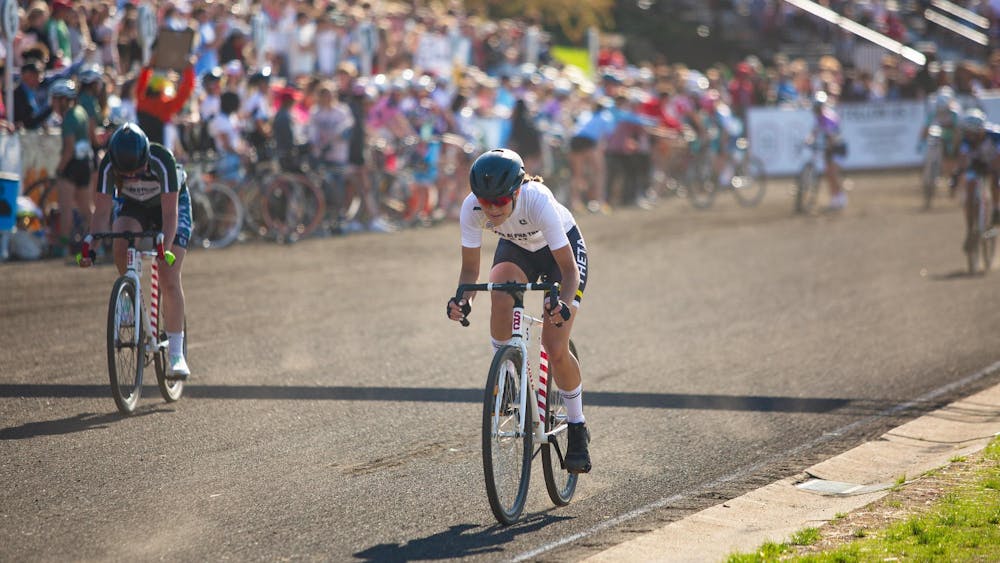The lights in the front of Room 300 in the Business School dim as the projection screen drops. A video appears displaying men and women in an unconventional business meeting location -- an art gallery.\nThe class watches intently as chair of the Kelley School of Business undergraduate program Marc Dollinger begins to explain the tape.\nThe video is the NBC reality television show "The Apprentice." The men and women in the video are contestants from two teams -- Versacorp and Protege. The clip illustrates the importance of team dynamics. For example, Protege's feuding when selecting a controversial artist's work to sell sends the team to the board room, where the show's creator and star Donald Trump resolutely pronounces Omarosa Manigault-Stallworth's dismissal with the show's trademark saying, "You're fired!"\nThe purpose: teaching his students business and life lessons from the show.\nDollinger said the lesson from this episode is to always treat people with respect -- in a business situation or outside one.\n"It pays to be nice," Dollinger said, pointing out Omarosa's inability to do so. "It's not overrated."\nDollinger has used the show to teach business lessons to his entrepreneurship class, New Venture Creations, and reflects a trend in business education of using the show as a teaching tool. The University of Washington recently added management lessons from 'The Apprentice' to its curriculum. \nKelley course lecturer Laura Schildkraut said the primary objective of the course is to have students come out better managers than they would be otherwise. The class can also provide opportunities for students to put themselves within the show to see how they would react.\n"We're using the show as kind of mini cases," Schildkraut said. "I look at Trump as a hiring manager and the tasks as role players. How better to prepare yourself for a job interview than to say 'what would you have done instead?' or 'what can we do differently to have a more successful outcome?'"\nAccording to a USA Today article, the undergraduate class, running from April to June, will use tapes of the show for discussion. Eighty students booked the two sessions of the course, with others occupying a waiting list.\nThe students, as team leaders, would write proposals and discuss their perspectives on similar situations as in "The Apprentice" and how they would handle them.\nDollinger said a class fully based on "The Apprentice" would be enticing to him, and he said it could be something the business school could experiment with, as long as there aren't copyright concerns.\nIn the meantime, Dollinger will continue instructing his students with lessons they can learn from "The Apprentice."\nThe former New Yorker said when he heard about the show, he was interested because of his admiration for Trump, the mostly entrepreneurial tasks the contestants would be doing and the close age of the contestants to the undergraduates in his class. Most of the contestants are between the ages of 25 to 35.\nThe show, which will air its 13th episode Thursday on NBC, has one contestant fired each week from the losing team, either Versacorp or Protege. The shows tasks have included selling lemonade on the street to organizing a celebrity auction.\nDollinger said while students need to remember they're watching television, the show does have practical traits that can be applied in the business and entrepreneurial world.\n"The tasks have to do with sales and promotions," Dollinger said. "They have them generating revenues, something that's measurable and tangible. The practicality is very good."\nDollinger said the show also corresponds well with the Kelley School's emphasis on teamwork, given the show is team-based.\nJunior Kara Morrison is in Dollinger's class and religiously watches the show each week. She said she enjoys discussing the show in class.\n"I think that we've talked a lot about the mistakes that people have made," Morrison said. "We talked a lot about Omarosa because she didn't get very far because other people didn't like her. Outside of your skills and abilities, those things, like being nice, can affect you."\nDollinger hopes students like Morrison will bring positive character traits into the business world.\n"What makes the show work are there are also moral lessons," Dollinger said. "People will draw moral conclusions that go beyond the business lessons."\n-- Contact sports editor John Rodgers at jprodger@indiana.edu.
You're fired!
Get stories like this in your inbox
Subscribe





